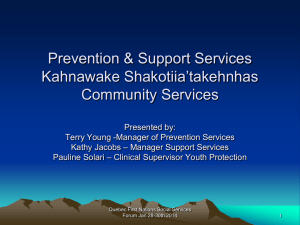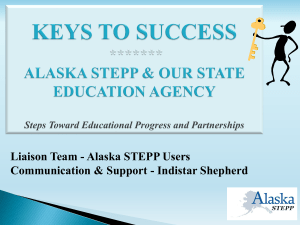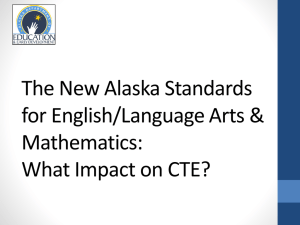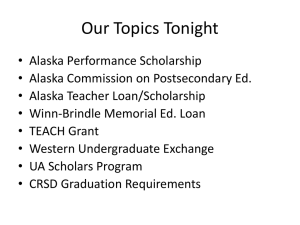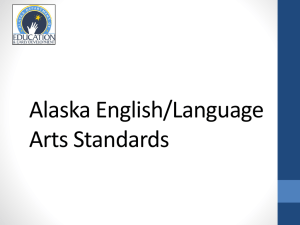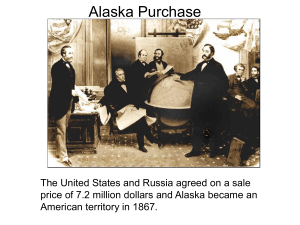Alaska`s Standards for Culturally Responsive Schools Presentation
advertisement
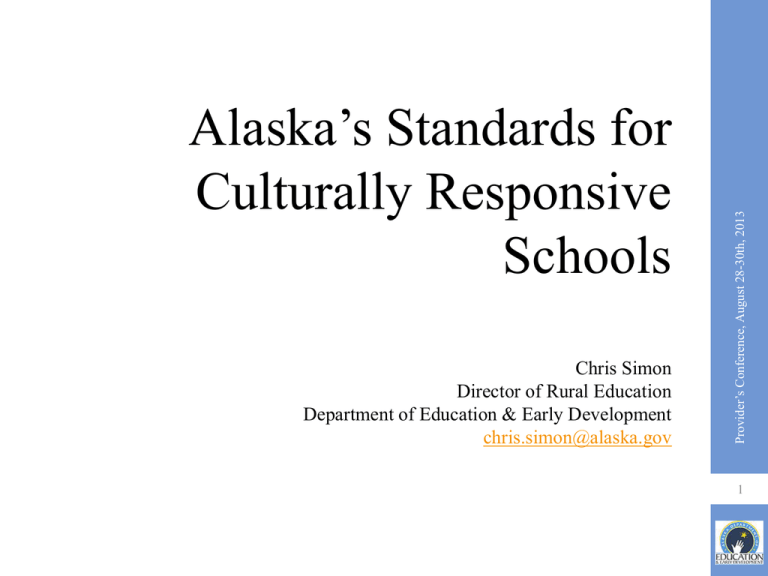
Chris Simon Director of Rural Education Department of Education & Early Development chris.simon@alaska.gov Provider’s Conference, August 28-30th, 2013 Alaska’s Standards for Culturally Responsive Schools 1 “Making up more than ten percent of Alaska's population, Native Alaskans are the state's largest minority group. Yet most non-Native Alaskans know surprisingly little about the histories and cultures of their indigenous neighbors, or about the important issues they face.” Libby Roderick, Alaska Native Cultures and Issues: Responses to Frequently Asked Questions Provider’s Conference, August 28-30th, 2013 The Need for Cultural Standards 2 “….the Alaska Rural Systemic Initiative developed the Alaska Standards for Culturally Responsive Schools. These standards, created with the help of Alaska Native stakeholders, provide guidelines for schools and communities as they examine how their practices promote the cultural well-being of their students.” Guide to Implementing the Alaska Cultural Standards for Educators Provider’s Conference, August 28-30th, 2013 The Need for Cultural Standards 3 The Alaska Rural Systemic Initiative was responsible for developing the cultural standards with funding from the National Science Foundation and Annenberg Rural Challenge, and with input from diverse stakeholders across the state, including: The Alaska Federation of Natives The Alaska Native Knowledge Network The Assembly of Alaska Native Educators The University of Alaska Provider’s Conference, August 28-30th, 2013 Who developed the Cultural Standards? 4 5 Provider’s Conference, August 28-30th, 2013 6 Provider’s Conference, August 28-30th, 2013 Provider’s Conference, August 28-30th, 2013 Alaska Native Education: Steps Toward Reciprocity 7 Timeline of progress 1733 – 1867: Russian-America Colony 1867: USA purchases Alaska 1959: Alaska becomes a State Mid 1970’s: REAA’s Established (local Boards of Education) Early 1990’s: Requirements of (6) credits in Multicultural and Alaska Studies 1995: Alaska Rural Systemic Initiative 1998: Standards for Culturally Responsive Schools 1999: Guidelines for Preparing Culturally Responsive Teachers 2000: State Board of Education adopts student section of the Standards for Culturally Responsive Schools 2009: Director of Rural Education Position Created at EED 2010: State Board Adopts Educator Sections of Standard Provider’s Conference, August 28-30th, 2013 1971: Alaska Native Land Claims Settlement Act 2010: Stakeholder Group Review of the Standards for Culturally Responsive Schools 2011: Rubrics created for Culturally Responsive Classrooms 8 Provider’s Conference, August 28-30th, 2013 What are the Standards? 9 Provider’s Conference, August 28-30th, 2013 What are the Standards? 10 Connect Benchmark Contextualize Provider’s Conference, August 28-30th, 2013 What is a Cultural Standard? 11 A. Educators incorporate local ways of knowing and teaching in work B. Educators use the local environment and resources on a regular basis to link what they are teaching to the everyday lives of their students C. Educators participate in community events and activities in an appropriate and supportive way D. Educators work closely with parents to achieve a high level of complementarities between home and school educational expectations E. Educators recognize the full educational potential of each student and provide the challenges necessary to achieve their potential Provider’s Conference, August 28-30th, 2013 Cultural Standards for Educators 12 Provider’s Conference, August 28-30th, 2013 Guide to Implementing the Alaska Cultural Standards for Educators 13 Activity – Discuss where you/your school rates on the indicators. – Discuss how you might use this information in your work. • What might be your challenges? • What might be your strengths? Provider’s Conference, August 28-30th, 2013 • Divide into Groups 14 15 Provider’s Conference, August 28-30th, 2013 The Alaska Standards for Culturally Responsive Schools will: Complement instructional content standards Support the development of college-, career-, and community-ready graduates Help contextualize academic content within the students’ individual world views Honor the support and importance of community in K-12 education Shift the focus in curriculum from teaching about culture heritage to teaching through cultural heritage Provider’s Conference, August 28-30th, 2013 How will Alaskan students benefit from the Cultural Standards? 16 State regulation regarding the Cultural Standards has changed recently. The Cultural Standards are now a required consideration in every Alaskan teacher’s performance review. Provider’s Conference, August 28-30th, 2013 Changes to regulation 17 Chris Simon chris.simon@alaska.gov 907.451.2355 Provider’s Conference, August 28-30th, 2013 THANK YOU! 18

